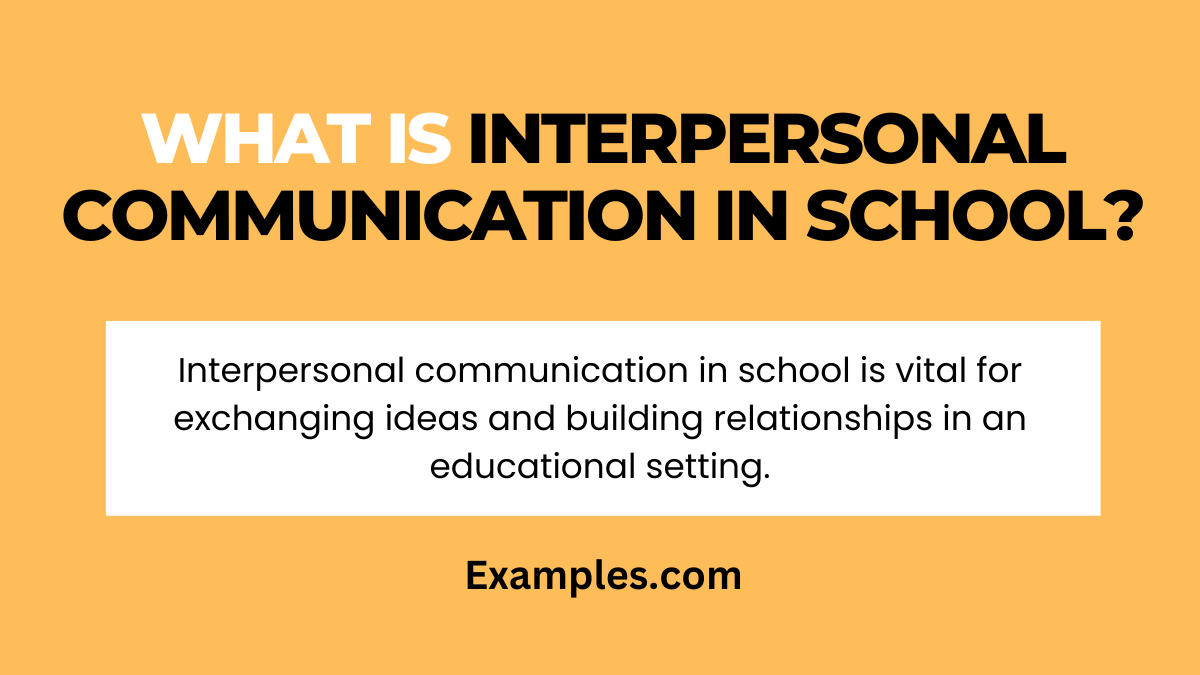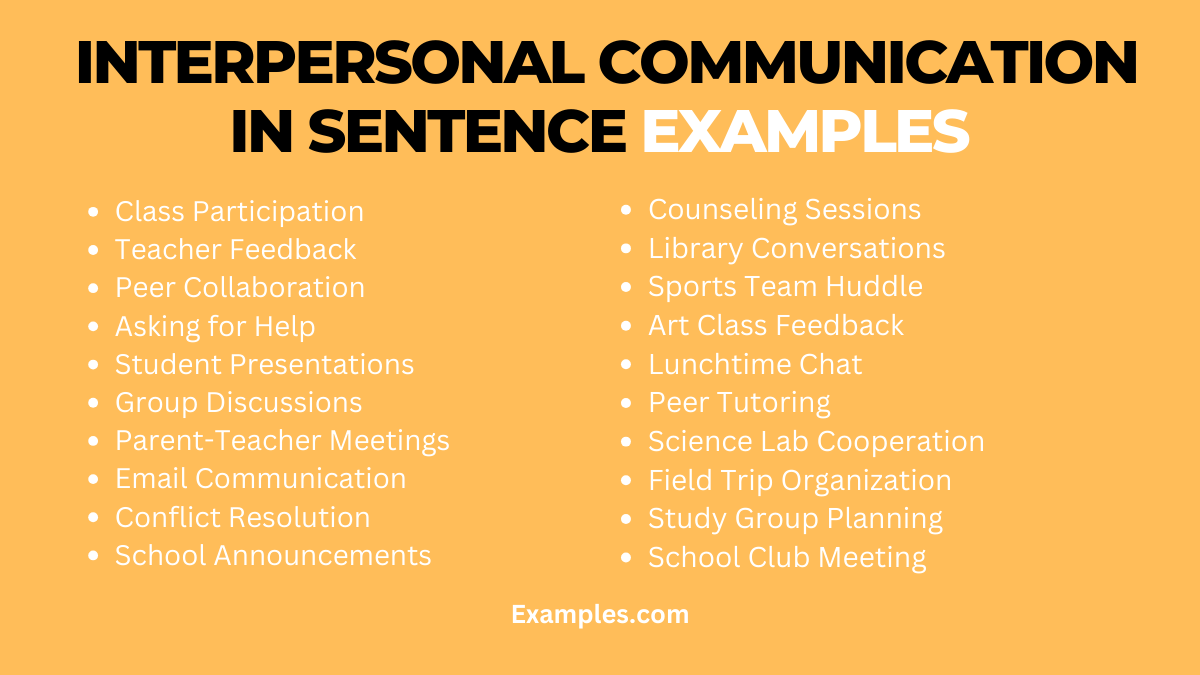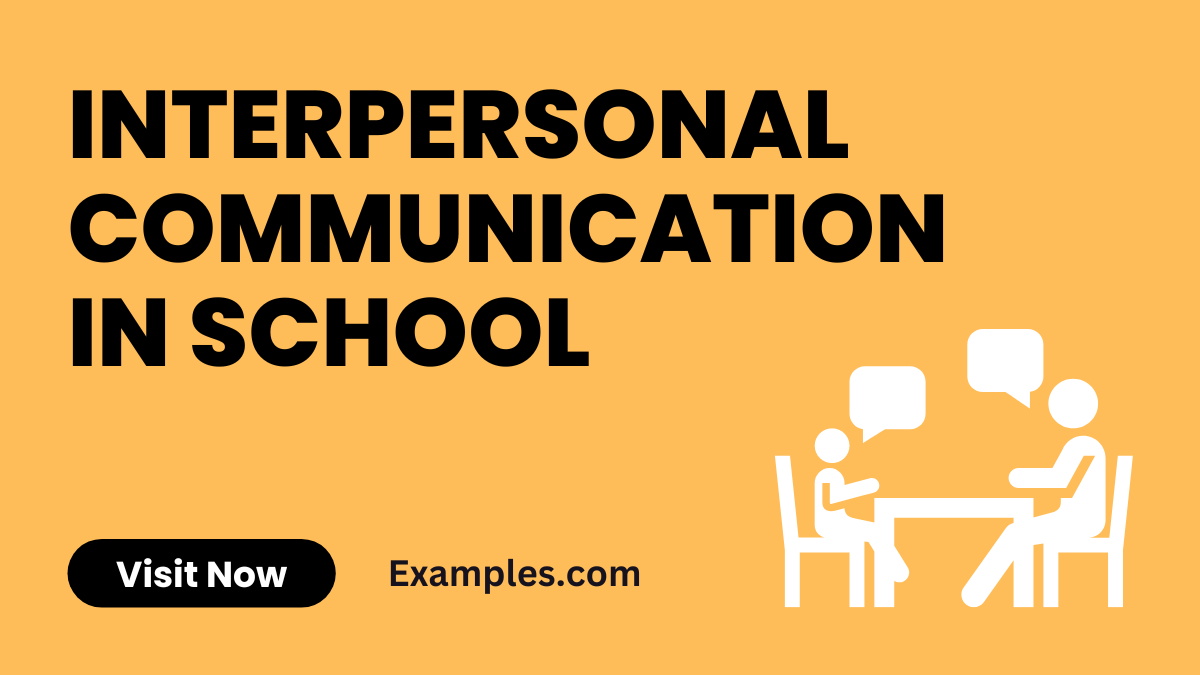19+ Interpersonal Communication in School Examples
Interpersonal communication in school is an essential skill that encompasses a wide range of interactions, emphasizing the importance of oral communication. It involves how students and teachers convey and interpret information, ideas, and emotions within the educational environment. Mastery of these communication skills is crucial for academic achievement, effective classroom participation, and building healthy relationships. It includes classroom discussions, group projects, and peer interactions, all pivotal for a comprehensive and enriching school experience.
What is Interpersonal Communication in School?

Interpersonal communication in school refers to the way students and educators exchange thoughts, information, and feelings within an educational setting. It encompasses various forms of communication, including verbal, non-verbal, and digital methods. Effective interpersonal communication is vital for a productive and positive school environment, facilitating learning, collaboration, and social development. It plays a key role in enhancing students’ understanding, participation, and interaction, contributing significantly to their overall educational experience.
20 Interpersonal Communication in School Examples

Interpersonal communication in school is a key component of the educational experience, embracing a variety of verbal, non-verbal, and digital interactions. These interactions are crucial not only for academic success but also for social development. From classroom discussions to casual conversations in the hallway, each instance of communication plays a vital role in building relationships, enhancing learning, and fostering a supportive school community. The examples provided below showcase the diverse ways in which students and teachers engage in interpersonal communication within a school setting.
- Class Participation: “Can someone explain their understanding of this concept?” Encouraging students to share their thoughts in class.
- Teacher Feedback: “Your essay was well-written, but try to expand on your main argument.” Offering constructive feedback on assignments.
- Peer Collaboration: “Let’s divide the project tasks according to our strengths.” Discussing and planning group work.
- Asking for Help: “I didn’t understand this part of the lesson. Can you explain it again?” Seeking clarification from teachers or peers.
- Student Presentations: “Today, I’ll present my findings on the science project.” Sharing knowledge and information with the class.
- Group Discussions: “What are everyone’s thoughts on this topic?” Facilitating open discussions among peers.
- Parent-Teacher Meetings: “Let’s discuss how we can support your child’s learning at home.” Conversing about student progress.
- Email Communication: “I’ve attached my assignment. Please let me know if there are any issues.” Communicating via digital platforms.

- Conflict Resolution: “I feel upset when you interrupt me. Can we talk about it?” Addressing and resolving interpersonal conflicts.
- School Announcements: “Attention students: Please gather in the auditorium for a special presentation.” Delivering information to the entire school.
- Counseling Sessions: “I’ve been feeling stressed about exams lately.” Expressing personal concerns in a supportive environment.
- Library Conversations: “This section is for quiet study. Please keep your voices down.” Enforcing rules in specific school areas.
- Sports Team Huddle: “Let’s work together and give our best in today’s game!” Motivating and strategizing with team members.
- Art Class Feedback: “I really like how you used color in your painting.” Sharing opinions in a creative setting.
- Lunchtime Chat: “What did everyone think of the school play last night?” Engaging in casual conversations.

- Peer Tutoring: “Let me show you a method that helped me understand this math problem.” Assisting classmates with academic challenges.
- Science Lab Cooperation: “Could you please pass the beaker? Let’s measure this accurately.” Working together in practical settings.
- Field Trip Organization: “Remember to stay with your partner during the museum visit.” Coordinating activities outside of school.
- Study Group Planning: “How about we meet in the library after school to study?” Arranging group study sessions.
- School Club Meeting: “Let’s brainstorm ideas for our next community service project.” Collaborating on extracurricular activities.
Types of Interpersonal Communication in School
In schools, interpersonal communication encompasses a variety of forms, each playing a critical role in students’ educational journey.
- Verbal Communication: Essential for classroom discussions and peer interactions.
- Non-Verbal Communication: Body language and facial expressions during presentations.
- Written Communication: Essays, reports, and classroom notes.
- Digital Communication: Online discussions and educational apps.
- Active Listening: Engaging attentively in lectures and conversations.
- Public Speaking: Delivering presentations and participating in debates.
- Feedback Exchange: Sharing and receiving thoughts on academic work.
- Group Communication: Collaborating in study groups and team projects.
Role of Interpersonal Communication in School
Interpersonal communication in schools plays a vital role in shaping the educational and social experiences of students.
- Facilitates Learning: Enhances understanding of academic content.
- Promotes Social Skills: Crucial for developing friendships and teamwork.
- Encourages Collaboration: Key in successful group projects.
- Aids Emotional Expression: Vital for sharing feelings and concerns.
- Enhances Teacher-Student Relationships: Builds mutual respect and understanding.
- Develops Conflict Resolution Skills: Essential in navigating disagreements.
- Supports Diversity and Inclusion: Encourages respect for different perspectives.
- Improves Leadership Skills: Crucial for student leaders and organizers.
Skills of Interpersonal Communication in School
Developing interpersonal communication skills is crucial for students in navigating their school years successfully.
- Effective Speaking: Articulating ideas clearly in class discussions.
- Empathetic Listening: Understanding peers’ and teachers’ perspectives.
- Clarity in Writing: Communicating effectively in written assignments.
- Technological Proficiency: Utilizing digital tools for communication.
- Conflict Management: Resolving disagreements constructively.
- Emotional Intelligence: Recognizing and managing personal and others’ emotions.
- Positive Body Language: Non-verbal cues to complement verbal communication.
- Assertiveness: Expressing needs and opinions confidently.
Importance of Interpersonal Communication in School
The importance of interpersonal communication in school settings cannot be overstated, impacting both academic and personal growth.
- Enhances Academic Performance: Effective communication leads to better understanding and learning.
- Builds Healthy Relationships: Fosters positive interactions among students and teachers.
- Develops Critical Thinking: Encourages articulate expression of ideas.
- Boosts Confidence: Improves self-esteem in both academic and social contexts.
- Facilitates Career Preparedness: Prepares students for professional communication scenarios.
- Encourages Inclusivity: Promotes respect and understanding of diverse viewpoints.
- Supports Emotional Well-being: Allows expression and management of emotions.
- Fosters Community Engagement: Enhances active participation in school activities.
Effective interpersonal communication is a key skill in relationships, enhancing understanding, connection, and growth. This comprehensive guide highlights its importance in various settings, particularly in schools, where it plays a pivotal role in shaping students’ academic and social development. By mastering these communication skills, students are better equipped for success in their personal and professional lives, underscoring the profound impact of effective communication in building strong, meaningful relationships.



